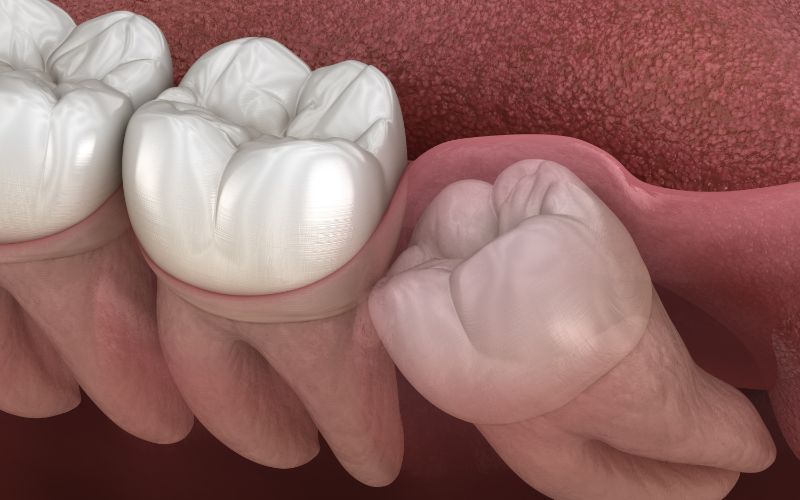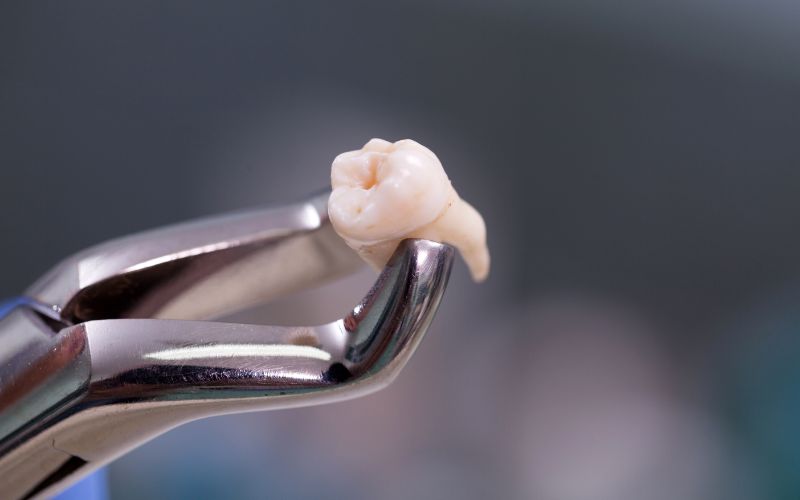Protect Your Overall Smile
Our teeth help us bite and chew our food as well as help maintain our mouth and jawbone structures. This is why dentists try to save your natural teeth whenever possible. However, in some cases, tooth extraction is necessary to preserve the integrity and health of your smile. A tooth extraction is a dental procedure in which a tooth is completely removed from its socket.
Dr. Sheehan may recommend a tooth extraction for a variety of reasons:
- The tooth is cracked or decayed beyond repair
- Overcrowded teeth
- You suffer from severe gum disease
- Dental trauma that results in damage to the tissues, ligaments, and bone that hold your tooth in place (tooth luxation)
- Impacted teeth (incredibly common for wisdom teeth)
Impacted Wisdom Teeth
The average mouth can hold 28 teeth that have their own specific function and work cohesively to provide protection and structure to your mouth. However, we have four additional teeth called wisdom teeth, or third molars, that typically come out between our late teens and early twenties.
Despite the name, wisdom teeth are notorious for becoming impacted, which means they erupt improperly or cannot erupt due to being in the wrong direction or position. This, along with the fact that most mouths cannot accommodate 32 teeth, oftentimes lead to pain and other issues. It’s incredibly uncommon for a wisdom tooth to grow in properly and without complications. Thankfully, Dr. Sheehan can remove your wisdom teeth to ease unnecessary pain and discomfort. If left alone, impacted wisdom teeth can damage nearby teeth or your jawbone increasing the risk of developing cysts, tooth decay, and gum disease.
Symptoms of an Impacted Wisdom Tooth
Not every wisdom tooth will be visible to the naked eye. Sometimes the tooth will grow in such an angle that it never erupts. Common symptoms of an impacted wisdom tooth include:
- Numbness
- Limited jaw function
- Swollen glands in the neck
- Halitosis (bad breath)
- Tenderness or pain in the gums and jaw
- Headaches or jaw aches
- Inflamed and bleeding gums

Attending your bi-annual dental examination with Dr. Sheehan can help us identify potential issues with your wisdom teeth before they grow impacted. However, if you’re experiencing any of the above symptoms, it’s important to seek immediate treatment. Removing an impacted wisdom tooth can prevent major problems as well as ease your pain and discomfort.

Tooth Extraction Process
The tooth extraction process is effective, safe, and can be completed in a few simple steps.
- Before your procedure, we’ll administer a local or general anesthetic depending on the type of extraction. This will numb the extraction site and ensure a comfortable, pain-free experience for you.
- Once you’re comfortable and the anesthesia has taken effect, Dr. Sheehan will gently remove your afflicted tooth from the gum tissue.
- Following the extraction, she’ll carefully stitch up your gums so that you can begin the healing process, followed by a gauze pad for you to bite down on to minimize bleeding.
Following your procedure, you’ll be under our care until the effects have worn off enough for you to travel home safely. We strongly recommend arranging transportation arrangements with someone you trust prior to your procedure, as it may take some time for the full effects of the anesthesia to subside.
Before you leave, we’ll provide you with a post-op kit containing aftercare instructions as well as antibiotics and pain medication to help you heal and mitigate residual pain. We’ll also help you schedule a follow-up appointment to ensure the total success of your extraction.
Aftercare Tips for Tooth Extraction
After your tooth extraction, the extraction site will be much more vulnerable to infection, so it’s really important to follow all of Dr. Sheehan’s instructions so that you can have a speedy, complication-free recovery. In general, we may suggest the following instructions:
- Rest for 24 hours after your extraction
- Take antibiotics and pain medication as prescribed
- Change the gauze pad as needed
- Avoid spitting, rinsing, or sucking on anything (including straws) for 24 hours
- Avoid drinking alcohol or smoking
- Avoid brushing or flossing the extraction site

Wisdom teeth extractions go smoothly and without complications. However, one condition, called dry socket, is something to look out for. In order to help the site heal, your body will form a blood clot around the socket to prevent food debris and bacteria from reaching it.
In rare cases, that necessary blood clot can become dislodged and instead of seeing the clot, you’ll see the whitish bone underneath. In this case, it’s best to make an appointment with Dr. Sheehan so we can clean the socket and fill it with a medical dressing.
Frequently Asked Questions
For most people, wisdom teeth usually erupt during their late teens or early twenties. Many of our patients have their wisdom teeth extracted shortly after they erupt. Postponing wisdom tooth extraction may increase the risk of further problems such as damage to the surrounding teeth, infection, and even nerve damage.
While many people will need to have their wisdom teeth removed, not everyone will. If your wisdom teeth fully erupt and are not impacting your surrounding teeth, you may not need to have them removed. Especially if they are healthy and you’re able to clean them properly.
Gentle Tooth Extraction At Oakland Family Dental
When it comes to your smile, at times a tooth extraction can be the best thing for it but it doesn’t have to be a painful, inconvenient process. At Oakland Family Dental, our experts are dedicated to making your tooth extraction procedure as easy as possible. If you’d like to learn more about tooth extractions or you’re ready to schedule a consultation with Dr. Sheehan at our Waterford office, call us at (248) 674-0384 or click the button to the right so we can help you.
